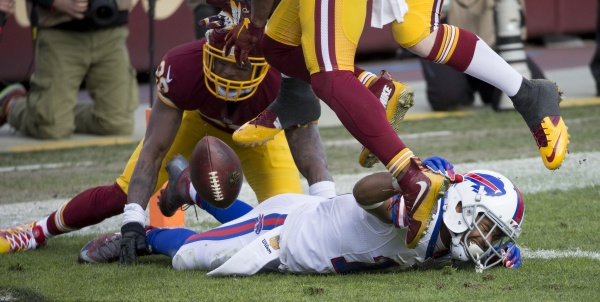Everyone Is to Blame for Violence in the NFL
KeithAllisonPhoto.com
A Buffalo Bills player is injured after a big hit by the Washington Redskins earlier this season. (Keith Allison/Flickr)
January 28, 2016
At a time in which the character of the participants in the National Football League (NFL) is being brought into question, there have been calls to hold owners, coaches and players accountable for their own actions. There has been an attempt to crack down on serious incidents of player misconduct on and off the field, but fiery personalities have led to games, seasons and perhaps even careers being called into question. Many NFL fans are looking to point a finger at one single source of player misconduct to chastise, but the tough answer is that there is responsibility on every hierarchical level.
Some notable incidents occurring within the last month have included New York Giants star wide receiver Odell Beckham Jr. in their season-ending Week 15 loss to the Carolina Panthers. Additionally, the American Football Conference (AFC) Wild Card Game between the Pittsburgh Steelers and Cincinnati Bengals on Jan. 9 contained a number of contentious moments. These games were characterized by unsportsmanlike conduct, consisting of ongoing chatter between opposing players (Beckham and Panthers’ cornerback Josh Norman) and illegal hits throughout the Steelers-Bengals bout. Many pundits are demanding culpability for these actions, but in reality there are many people at fault for this unacceptable behavior.
Throughout the Giants’ loss to the Panthers at MetLife Stadium on Dec. 20, Odell Beckham Jr. and Josh Norman were going at each other. The exact details of the conflict are unknown, but the plays on the field appeared to show Norman’s physical (and perhaps penalty-worthy) defense getting under Beckham’s skin. In many of the plays following the Giants’ first drive, Beckham returned the physicality at nearly every opportunity.
This chippy play resulted in words being exchanged and eventually punches thrown on Beckham’s part, for which he received a one-game suspension handed down by the NFL. Norman received fines in excess of $25,000 for his actions, which he is appealing. Despite his allegations of verbal threats, Beckham appeared to be the aggressor in the most important game of New York’s season.
Then head coach Tom Coughlin refused to take action by removing Beckham, saying, “to depict this as Odell Beckham being wrong and the only one wrong, is not right… it’s not the way it was.” Despite many questioning the second-year receiver’s temperament, Coughlin defended his player and the decision to leave him in the game. “I will not defend [Beckham’s] actions [Dec. 20] because they were wrong. But I will defend the young man and the quality of his person.” Perhaps it was Coughlin’s responsibility to bench Beckham, or other coaches’ and teammates’ duty to attempt to reign Beckham in, but in the end it comes down to personal accountability.
Another breakdown of player conduct occurred on a bigger stage during the AFC Wild Card Game on Jan. 9, in which key mistakes were made on the parts of Bengals linebacker Vontaze Burfict and cornerback Adam Jones. With a little over a minute left in the game and the Bengals leading 16–15, Cincinnati fumbled the ball and Pittsburgh recovered, leading to a monumental collapse. The Steelers drove to midfield with less than 30 seconds left when Burfict laid a vicious hit on wide receiver Antonio Brown, which drew a 15-yard penalty for unnecessary roughness.
The call led to outrage on the part of many Bengals players and coaches, eventually leading to a confrontation between personnel from both teams. Bengals’ cornerback Adam Jones verbally confronted and grabbed Steelers’ assistant Joey Porter, which resulted in a second 15-yarder for unsportsmanlike conduct. These miscues gave the Steelers 30 free yards and put them into field goal range, concluding with a successful 35-yard attempt from Steelers’ kicker Chris Boswell to win 18–16. Lack of self-control on the part of the players was a major disruption to the team, in this case prolonging the playoff drought that has bedeviled the Bengals and their fans for decades.
It is the responsibility of the head coach to dole out discipline in the form of benching; unfortunately it was too tough for Coughlin to make the call to relieve their best receiver against the best team in the NFL this season. It is the responsibility of fellow teammates to police their peers and be voices of leadership because rash, petulant actions of individual players is a detriment to the team as a whole. In fact, the league has long held a tradition of not disciplining players for violent hits, because it’s what the fans want to see.
Despite numerous cries for improved safety in the NFL, the league is slow to change rules regarding violent contact. A league devoid of dangerous tackles and contentious flare-ups between players would not lead to the end of critical outcry. Despite many former players coming out against the high-risk style of play, many analysts and casual fans have called the safer NFL “soft” and “boring.” As long as the viewers are tuning in, dangerous play is not going to end any time soon. While fans certainly have a huge impact in the development of the NFL game, it is really not the fans’ choice. In the end, it is the decision of the players to hold themselves accountable because they are not only setting examples to children that idolize athletes, but they are professional athletes, which connotes a certain manner of behavior. When you are hired to do a job, it is implied that you are to act in a certain way befitting your employment, and it is no different for pro athletes.










